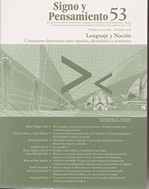Abstract
Location, territory, or space in our global era seems to have lost its importance vis-à-vis the hegemony of time. Yet, the experiences of contemporary social movements and their practice are firmly anchored to a particular place (Escobar, 1996), thus showing that the category (space-place-location) is still in force. Hence, space, as seen from the former perspective, would not contribute to explaining such practices because it is too abstract a category to take into account the links between territory, culture, identity, and power. Thus, what we call the policies and politics of place come to the surface, a notion that allows for a novel look at spatial reconfigurations; i.e., the local dynamics, and their connections with the global milieus, and help us understand better why some political and epistemological proposals are made possible by the place, for the place, and from the place or locality.
Universidad Colegio Mayor de Cundinamarca.
— (2006b), “Entre la geografía y las relaciones internacionales”, en Tabula-rasa, núm. 005, Universidad Colegio Mayor de Cundinamarca.
Augé, M. (1993), Los no lugares espacios del anonimato. Una antropología de la sobremodernidad, Barcelona, Gedisa.
Bauman, Z. (2002), Modernidad líquida, México, Fondo de Cultura Económica. Bettin, G. (1982), Los sociólogos de la ciudad, Barcelona, Gustavo Gili.
Escobar, A. (1996), La invención del tercer mundo. Construcción y deconstrucción del desarrollo, Bogotá, Norma.
— (2005), Más allá del tercer mundo. Globalización y diferencia, Bogotá, Instituto Colombiano de Antropología e Historia (ICANH).
— (2007), “El lugar de la naturaleza y la naturaleza del lugar: ¿globalización o posdesarrollo?” [en línea], disponible en: http://www.unc. edu/~aescobar/text/resume.doc, recuperado: 20 de abril de 2007.
Escobar, A. y Harcourt, W. (2002), “Lugar, política y justicia: las mujeres frente a la globalización”, en Desarrollo, núm. 45.
Flórez, J. (2007), Tácticas de des-sujeción: disensos, subjetividad y deseo en los movimientos sociales. Relaciones de género en la red ‘proceso de comunidades negras’ del Pacífico colombiano [tesis de doctorado], s.d.
Grosfoguel R. (2007). “Implicaciones de las alteridades epistémicas en la redefinición del capitalismo global: transmodernidad, pensamiento fronterizo y colonialidad global”, en Monica Zuleta, Humberto Cubides y Manuel Roberto Escobar (eds). ¿Uno solo o varios mundos? Diferencia, subjetividad y conocimientos en las ciencias sociales contemporáneas. Siglo del hombre editores, Universidad Central-Iesco.
Haraway, D. (1991), Simios, cyborgs y mujeres: la reinvención de la naturaleza, Barcelona, Cátedra.
Herrera, D. y Piazzini, C. (eds.) (2006), (Des) territorialidades y (No) lugares. Procesos de configuración y transformación social del espacio, Medellín, La Carreta Editores.
Kuusisto, A. K. (1999), “Politics of place and resistence: the case of Northern Ireland”, en Nordia Geographical Publications, vol. 28, núm. 2, disponible en: http://www.uta.fi/laitokset/yhdt/esittely/henkilokunta/julkaisuluettelot/anna-kaisa.kuusisto-arponen.pdf recuperado: 15 de agosto de 2007.
Massey, D. (1994), Space, Place and Gender, Minnesota, University of Minnesota Press.
Mato, D. (coord.) (2005), Políticas de economía, ambiente y sociedad en tiempos de globalización, Caracas, Facultad de Ciencias Económicas y Sociales, Universidad Central de Venezuela.
Montenegro, M. y Pujol, J. (2003), “Conocimiento situado: un forcejeo entre el relativismo construccionista y la necesidad de fundamentar la acción”, en Revista Interamericana de Psicología, vol. 37, núm. 2, pp. 295-307.
Mouffe, C. (2005), “Política y pasiones: las apuestas de la democracia”, en Arfuch, L. (comp.), Pensar este tiempo, Buenos Aires, Paidós.
Oldenburg, R. (1999), The Great Good Place: Cafes, Coffee Shops, Bookstores, Bars, Hair Salons, and Other Hangouts at the Heart of a Community, Nueva York, Marlowe and Company.
Oslender, U. (2000), “Especializando resistencia: perspectivas de ‘espacio’ y ‘lugar’ en las investigaciones de movimientos sociales”, en Restrepo, E. y Uribe, M. V. (eds.), Antropologías transeúntes, Bogotá, Instituto Colombiano de Antropología e Historia (ICANH).
Rodríguez, M. y Alverneque, I. (2008), “Las espacialidades abiertas de América Latina” [en línea], disponible en: http://www.lafogatadigital.com.ar/planeta/lasespa.pdf, recuperado: 22 de febrero de 2008.
Simmel, G. (1939), “El espacio y la sociedad”, en Sociología, tomo II, Buenos Aires, EspasaCalpe.
Walsh, C.; Schiwy, F., y Castro-Gómez, S. (eds.) (2002), Indisciplinar las ciencias sociales. Geopolíticas del conocimiento y colonialidad del poder. Perspectivas desde lo andino, Quito, UASB/Abya Yala.
This journal is registered under a Creative Commons Attribution 4.0 International Public License. Thus, this work may be reproduced, distributed, and publicly shared in digital format, as long as the names of the authors and Pontificia Universidad Javeriana are acknowledged. Others are allowed to quote, adapt, transform, auto-archive, republish, and create based on this material, for any purpose (even commercial ones), provided the authorship is duly acknowledged, a link to the original work is provided, and it is specified if changes have been made. Pontificia Universidad Javeriana does not hold the rights of published works and the authors are solely responsible for the contents of their works; they keep the moral, intellectual, privacy, and publicity rights.
Approving the intervention of the work (review, copy-editing, translation, layout) and the following outreach, are granted through an use license and not through an assignment of rights. This means the journal and Pontificia Universidad Javeriana cannot be held responsible for any ethical malpractice by the authors. As a consequence of the protection granted by the use license, the journal is not required to publish recantations or modify information already published, unless the errata stems from the editorial management process. Publishing contents in this journal does not generate royalties for contributors.


